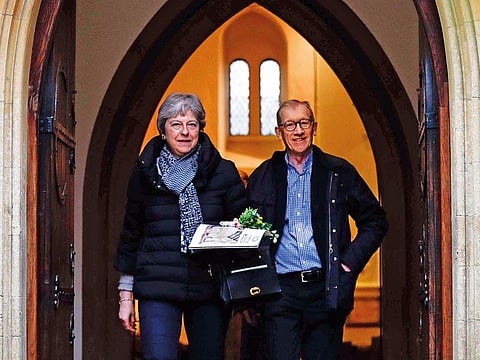May determined to hold fourth vote on deal
MPs have rejected withdrawal agreement three times already

DUBLIN: If at first you don’t succeed, try, try and try again. That seems to be the mantra for British Prime Minister Theresa May who is considering putting the Brexit withdrawal agreement to a fourth parliamentary vote.
That withdrawal agreement, negotiated between her government and Brussels on Brexit, has already been voted down three times over the past three months. But with no other consensus on how to move forward and with a deadline of April 12 looming — the danger of a no-deal Brexit where the UK would crash out without formal agreements is growing daily.
On Monday, MPs will try again to reach some agreement on possible alternatives, including holding a second referendum, staying in the Europe’s custom union or asking for a long extension to Brexit. They voted on these proposals last Wednesday, and all the proposals were voted down.
Badly weakened by the series of defeats and offering to step down if her deal is eventually passed, Prime Minister May is coming under intense pressure from members of her own Conservative party to take the UK out of Europe — even if that means a no-deal Brexit.
The opposition Labour party is hinting it may another vote of no confidence in Prime Minister Theresa May’s government, the party’s foreign affairs spokeswoman Emily Thornberry said on Sunday.
May’s government survived a vote of no confidence in January, the day after her Brexit deal was rejected for the first time.
And former British Prime Minister John Major has said he believes May’s withdrawal deal with the EU may go through parliament.
Speaking on the BBC’s Andrew Marr Show on Sunday, Major said the deal “might be the least bad option”.
He said exiting the EU without a deal would put at risk the union with Scotland and, over time, Northern Ireland, and he said that was “too high a price”, adding the structure of the British political system was now at risk.
The UK’s Justice Secretary said the government would have to “consider very carefully the will of parliament” if MPs voted for a softer form of Brexit.
Speaking on the same programme, David Gauke said he did not think it would be “sustainable to ignore parliament’s position” and that the Prime Minister would have to “seriously consider” its view.
Gauke said he did not think the British public “would thank us if we left without a deal” and said a general election would not resolve the current impasse.





